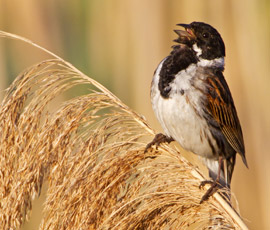Farmers praised for reed bunting increase

Changes in farming practices have been credited for a tenfold increase in reed bunting numbers at a Cambridgeshire reserve.
Volunteers working at the RSPB’s Fowlmere reserve counted 1,000 reed buntings on one day in February compared with 100 in 2006.
The dramatic rise in bird numbers of the threatened species comes after farmers nearby planted plots of seed-rich plants in an attempt to boost bird populations.
The birds rely on farmland for food and roost overnight in reed beds, like those at Fowlmere.
Robert Law, who farms near the reserve in Royston, Cambridgeshire, told the BBC: “We are the custodians of the countryside and have a duty to ensure there is always space for nature.
“It’s wonderful to see that it is giving local wildlife populations a boost.”
RSPB farmland advisor Richard Winspear said there were several farmers in the area who wanted to do their bit for nature and planting patches of wild bird seed mix, under agri-environment schemes, was having a positive effect.
“This provides vital winter food for seed-eating birds like reed buntings, corn buntings, yellowhammers and linnet,” he added.
Mr Winspear said the conservation-friendly farming methods were “backed by rigorous scientific evidence”.
“If there were more of these measures in our countryside then we could reverse farmland bird declines,” he added.
Reed bunting numbers fell to their lowest levels in the UK for five years last year.
The British Trust for Ornithology (BTO) blamed last year’s cold snap for the 23% decline in the birds, according to its annual survey.
BTO surveys reveal there has been a 48% decline in farmland birds since 1970.

